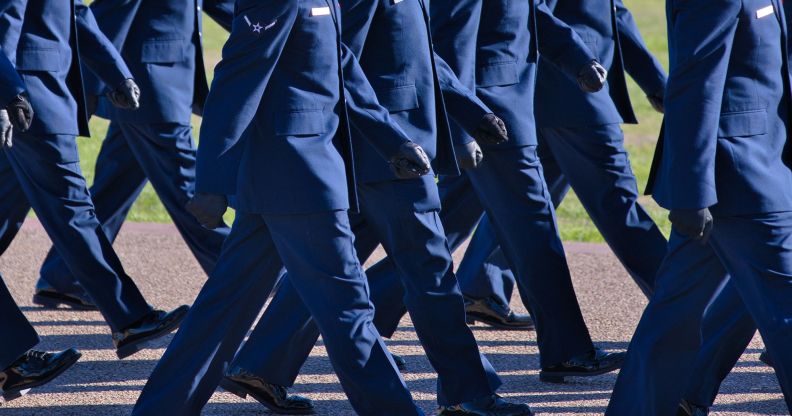Health
US Air Force Denies Retirement Benefits to Long-Serving Trans Troops

The US Air Force is under scrutiny following reports that it will deny retirement benefits to long-serving transgender and non-binary service members. A leaked memo indicates that individuals with between 15 and 18 years of military service will be forced to leave the armed forces without the retirement benefits typically available to long-serving personnel. This decision aligns with recent actions aimed at removing transgender troops from military service, a process initiated by an executive order from former President Donald Trump.
According to a memo obtained by Reuters, Brian Scarlett, the Assistant Secretary for Manpower and Reserve Affairs, stated that an exception to the early retirement policy for those experiencing gender dysphoria will not apply to certain long-serving trans troops. Those affected will have to choose between a lump-sum separation payment, usually available to junior personnel, or face involuntary discharge. Such discharges could lead to dishonorable status, which would forfeit additional benefits for veterans.
Previously, approximately a dozen transgender service members were informed in May that they could apply for early retirement. However, their approvals have since been revoked, with the Air Force claiming these decisions were made prematurely. A spokesperson clarified that while members with 15-18 years of honorable service were allowed to request exceptions, none were granted. Instead, they are now eligible for voluntary separation, which offers compensation at double the rate of involuntary separation pay.
Reactions to the Policy Change
The Human Rights Campaign has condemned the Air Force’s decision. Jay Brown, the Campaign’s Chief of Staff, described the move as “indefensible.” He stated that the Trump administration is unjustly stripping transgender troops of earned benefits after years of dedicated service, declaring, “This has nothing to do with military readiness; it’s cruelty for cruelty’s sake.”
Active-duty personnel were informed in a memo from Pete Hegseth, the Secretary of Defense, that they had until June 6, 2024, to voluntarily depart or risk being discharged. Reserve and National Guard members received a deadline of July 7, 2024 for similar actions.
Legal documents released in March highlight the Trump administration’s challenges in justifying the disqualification of transgender troops. Government lawyers have attempted to argue that transgender personnel impose financial burdens on the military due to the costs associated with gender-affirming care, which has amounted to approximately $52 million over the past decade. This figure is notably small compared to the Pentagon’s projected budget of $961.6 billion for 2026.
The military’s treatment of transgender individuals continues to spark controversy and debate, raising significant questions about the balance between policy and the rights of service members. As this situation unfolds, the impact on affected personnel and their families remains a matter of concern for advocacy groups and the wider public.
-

 Entertainment6 days ago
Entertainment6 days agoKim Cattrall Posts Cryptic Message After HBO’s Sequel Cancellation
-

 Entertainment6 days ago
Entertainment6 days agoMarkiplier Addresses AI Controversy During Livestream Response
-

 Politics4 weeks ago
Politics4 weeks agoPlane Crash at Southend Airport Claims Four Lives After Takeoff
-

 Lifestyle1 week ago
Lifestyle1 week agoTesco Slashes Prices on Viral Dresses in Summer Clearance Sale
-

 Top Stories4 weeks ago
Top Stories4 weeks agoAustralian Man Arrested for Alleged Damage to Stone of Destiny
-

 Entertainment1 week ago
Entertainment1 week agoEmmerdale Characters Face Danger as Stabbing Shakes Village
-

 Business4 weeks ago
Business4 weeks agoTrump’s “One Big Beautiful Bill” Faces Economic Scrutiny
-

 Sports7 days ago
Sports7 days agoCommunity Pays Tribute as Footballer Aaron Moffett Dies at 38
-

 Business4 weeks ago
Business4 weeks agoNew Study Links Economic Inequality to Lower Well-Being Globally
-

 Sports4 weeks ago
Sports4 weeks agoSheffield United’s Young Talent Embraces Championship Opportunity
-

 Health4 weeks ago
Health4 weeks agoAI Tool EAGLE Streamlines Lung Cancer Mutation Detection
-

 Lifestyle4 weeks ago
Lifestyle4 weeks agoBrits Identify Adulting Challenges: Cleaning, Cooking, and Time Woes












